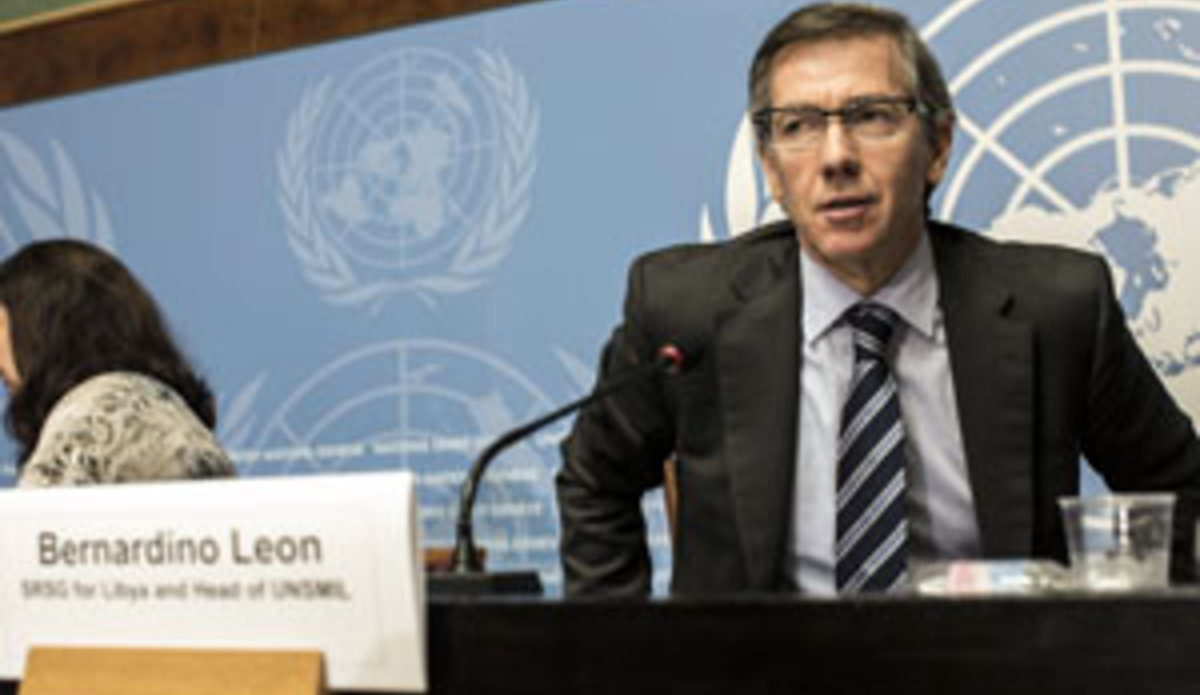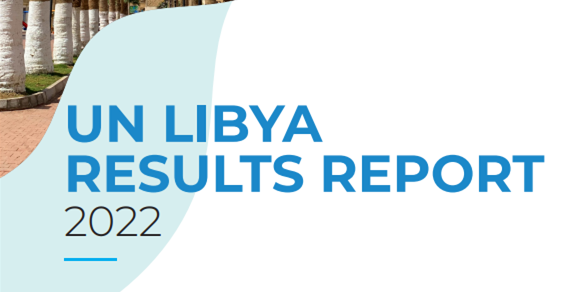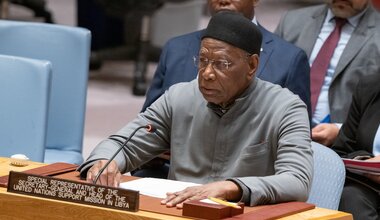Transcript of a media stakeout by SRSG for Libya, Bernardino Leon, in Geneva 04 September 2015
Transcript of a media stakeout by Special Representative of the Secretary-General (SRSG) for Libya and Head of the United Nations Support Mission in Libya (UNSMIL), Mr. Bernardino León, at the Political Dialogue round in Geneva
Geneva, 4 September 2015
(Near verbatim transcript)
SRSG: Hello. Good afternoon. After long hours of discussions the first thing I would like to do is to apologise for the long hours you have been waiting for this press statement. This is the nature of complicated negotiations, and indeed I think at this stage you are well aware this is a very complicated negotiation.
We are making progress and my first comment is that we are now, after the meetings we had yesterday and today in Geneva, in a better position than when we started.
We have clarified a number of points with the different delegations, and particularly with the GNC delegation, which had, as you know, some remarks and some concerns which were coming from the time in which the Skhirat text was voted until today. And I think we have clarified all these points. We still have a couple of issues that the GNC will have to consult with their colleagues and that we also will discuss inside the team in order to make proposals. But what I can tell you at this stage is that the GNC is still involved, all the parties are ready to continue the discussions, we have already names that have been proposed by different participants, and we hope also that the GNC delegation will join the talks next week, together with the others proposing names.
So we might be starting the final days of these talks and hopefully have the possibility to reach an agreement, that as you know we would like to have ready, endorsed, and signed, by 20 September.
So, a positive mood. Good momentum. Still a lot of work to do. As I told you the last time we met the last mile is the most difficult one. We have the feeling, as we are now exhausted after long hours of meetings, that we still have this extra mile and it is going to be really difficult and tough, but possible.
Let me tell you that personally, I have always repeated this, I am militant in the cause of optimism. So I think my message to the Libyans first and foremost, and my message to the international community, is that we really have a chance to reach a final agreement in the coming days and that we cannot afford, Libya cannot afford, to miss this opportunity.
Now I would be glad to answer your questions.
Q: Thank you very much. Two small questions. The first, I understand you received already the names proposed by the GNC for Prime Minster and Vice Prime Minister. The second question, you have the files, the annex, on the national Government for the future. For the first one, the State Council, did you reach any agreement on any of those points?
SRSG: On the first question, we have the names from the HoR [House of Representatives] but not yet from the GNC [General National Congress]. Hopefully we will have the names when we meet again, probably next Wednesday. On the second question, we are working on all the annexes. There are still two annexes. Annex 1, which is the list of the Government, and Annex 3, which is the State Council, and they will be the last ones to be discussed. So we have not started yet the discussions on those two annexes.
Q: The GNC representatives have said that you have proposed to them new mechanisms to include some of their remarks. Will they be included in the initial first draft?
SRSG: Well, we believe that most of them can be addressed in the annexes, but some of them can also be included in the final provisions. The final provisions is the part of the text we have to add to the main agreement, and we will be making proposals on this point. I have also explained many times that we should be flexible on the overall package. What is important here is to address the specific concerns of all the parties. No one should be expected to finally support the agreement if their concerns are not addressed. And what we will try in the coming days is to make different proposals on where this should fit. But basically we believe that, through the final provisions and the annexes, it will be possible to address these nine points we have been discussing today with the GNC.
Q : (inaudible)
SRSG : En principe, oui. En principe, le Congrès nous a confirmé aujourd'hui qu'ils seront la semaine prochaine dans les réunions. Concernant le contenu de nos discussions, comme je vous ai dit, on a travaillé dans des créneaux. Le premier, c'est le travail sur les annexes, le travail sur les noms qui seront inclus dans le gouvernement. Donc on a échangé des vues avec tous les participants, on a distribué de nouvelles idées; maintenant nous attendons le feed-back des participants.
De l'autre côté on a eu cette longue réunion avec le Congrès pour discuter ces neuf points qu'ils nous avaient été présentés et que j'espère que maintenant ont été l'objet d'un accord général. Comme je l'ai dit il y a encore deux points qui vont exiger encore des discussions mais en général je crois qu'il y a un esprit assez positif et il y a la sensation avec le autres membres du dialogue qu'îl sera possible de parvenir à une solution ou toutes les préoccupations et tous les commentaires de toutes les parties seront prises en considération.
Q: (inaudible)
SRSG : On parle d'un accord qui devrait être signé au plus tard le 20 septembre et dont l'application devrait commencer à partir du 20 octobre.
Q: As I understand Mr. Leon, in Geneva and in Morocco, the delegation of the parliament wouldn't agree to discuss the points proposed by the GNC. Do you have agreement this time in Geneva from the parliament to put those points in the last annex?
SRSG: I have been discussing with the HoR delegation an exchange of views yesterday and today on these nine points and we believe that it is possible to accommodate the nine points while at the same point keeping the support for all the different solutions of the HoR, the House of Representatives, and the other participants. So for the moment we are there, for the moment I am positive, and this is why I am telling you that the mood is quite positive. So I don't think it is going to be a problem. I think we can include these nine points and have the support of the House of Representatives.
Q: Since you seem to be on the final stretch of this do you already have a time and a venue for some kind of signing ceremony on 20 September or 20 October?
SRSG: Not yet, this will be the final metres, or yards, of the final mile. The timing is more or less 20 September. I think all the participants and also the United Nations agree that this ideally should take place in Libya but we have still not discussed this with the participants. We will probably need, beyond this general idea that it could be in Libya, we will need to make different assessments – political, security – there will be a number of logistics and issues to consider before we can choose a specific location.
Q: Is it safe enough in Libya, is it secure enough for the UN? (remainder of question inaudible)
SRSG: I have been going to Libya quite often. It is a country with confrontations in different locations, fighting still ongoing in Benghazi, in Sirte, in the south, and this is what we are trying to overcome with this agreement. Whenever we travel to Libya we try to travel with the appropriate security measures. In case we finally decide to go to Libya it will be because the security assessment, as I said, together with political and logistical assessments, will be positive, and we will agree to go to a specific location.
I think it is too early now to talk about where we will go to sign an agreement when it is still pending a lot of work. Our focus now is this huge effort we will have to make in the coming days to reach the final agreement. And then we will decide on the specific location.
Q: (inaudible)
SRSG: No, no, we still have more meetings, we didn't finish. Maybe tonight, tomorrow morning. I am going to have now a meeting with the independents and the other representatives.
Thank-you very much.
 United Nations Peacekeeping
United Nations Peacekeeping UN
UN








